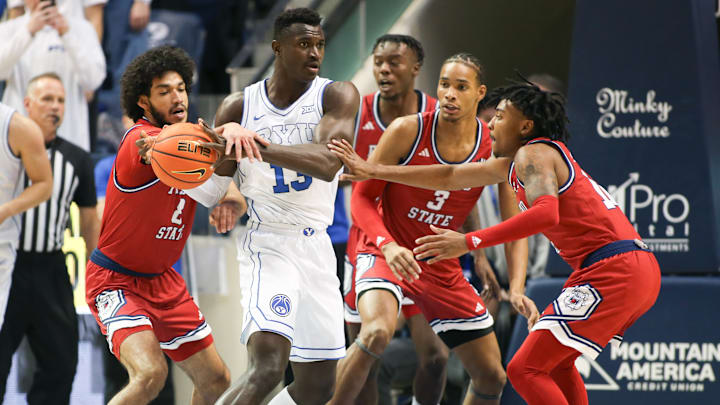Despite recent uneven returns, BYU basketball still offers a bevy of reasons to anticipate every matchup. NBA Draft experts have their eyes on Russian guard, Egor Demin, and Overtime Alum, Kanon Catchings, while junior Richie Saunders has made his presence known as one of the best hustle players/glue guys in the sport.
Even Trevin Knell and Dawson Baker provide dynamic scoring options and scrappy, creative offensive solutions on nearly every opportunity.
Yet, despite all this, one area of Kevin Young's roster has been remarkably muted throughout much of the season, and outright silent against stronger competition. If you ask me, BYU's greatest weakness lies in the frontcourt.
Basketball progressives often look at a traditional frontcourt the same way Albi the racist dragon looked at the badly burnt Albanian boy from the day before. The prototypical center should be long dead, didn't the wave of small ball and shooting centers exterminate bruising, physical bigs years ago?

Well, yes, and no. In direct opposition of natural selection, BYU basketball houses two big men--Fousseyni Traore and Keba Keita--who instead of being tall, rangy shooters, are shorter, physical big men with highly niche skill sets.
Traore, standing 6'6" and totaling 240 pounds, the Malian big is well-known for his back-to-the-basket post game, soft touch at the rim, and exceptional footwork for a player his size. Though six inches short of 7 feet, a ceiling where many centers in the Big 12 scrape their heads, Fouss plays bigger than his size.
Keita, a 6'8" transfer from Utah and fellow Malian, joined the team as a rim-protecting, above-the-rim finisher. While his game could use a healthy dose of finesse, Keba offers the Cougars some much-needed size, even if he's shorter than the Cougars' point guard, Demin.
Though these players offer distinct talents while on the court, the output has been underwhelming, if not shocking against tougher competition.
Traore, in particular, has been a liability on the floor since BYU's conference opener against Arizona State, where he flubbed a pair of turnovers and only managed four points in his 18 minutes of floor time. As the Cougars squared off with Houston, Fouss could only manage a single point as his trio of giveaways tripled his scoring output.
His counterpart in the starting five hasn't managed much better, beyond what his stats alone may suggest. Keba was a ghost against Houston, hacking three fouls and collecting a single rebound in a game that instantly raced from BYU's control. The Cougars' leading rebounder was a major reason Houston dominated the margins while cleaning the glass.
His lack of touch while finishing at the rim also haunted the Cougars, as Keita missed several attempts from point blank range.
As a proven capable finisher, we need to see more rim-rocking from the massive Malian.
KEBA KEITA DESTROYER OF RIMS
— BYU Men's Basketball (@BYUMBB) December 21, 2024
📺 ESPN+ pic.twitter.com/ArGYgBu9J3
Of course, blame can never be assigned to one group in a team sport, and I don't mean to point the finger at the leading bigs on Kevin Young's depth chart. Let me be clear: BYU's shortcomings are thanks to poor execution and performance across the board--no one cleared the sweeping arm of blame for the Houston result.
The Cougar frontcourt is leaving plenty to be desired at this point in the season, however, and increased productivity down low will allow BYU's perimeter stars to excel.
For Kevin Young's team to gel in his first season, the big fellas in the paint need to carry their weight.
